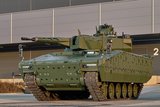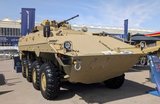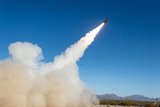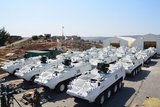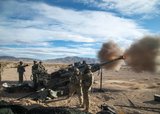British Army orders 100 more Boxer armoured vehicles
To date, some 1,500 Boxers in twenty different versions have been ordered by Australia and four NATO countries. (Photo: Rheinmetall)
The British government have signed a contract extension with ARTEC, a consortium of Rheinmetall and Krauss-Maffei Wegmann, to supply the British Army with an additional 100 Boxer 8x8 wheeled armoured vehicles.
The Boxer vehicles to be delivered include the three previously ordered variants of the Boxer; the infantry carrier, the command vehicle and the field ambulance.
Other Boxer variants include; armoured engineer vehicles, cargo/C2 vehicles, battle damage repair vehicles, driver training vehicles and several IFV variants.
By issuing this extension, the British government is exercising an option contained in the 2019 procurement contract, which includes 523 Boxer wheeled armoured vehicles in several variants.
Series production is currently underway in Germany, after which the bulk of Boxer production will take place in Britain.
According to Shephard Defence Insight, the first Boxers are planned to enter service with the British Army in 2023, which is also the IOC date for the service’s new strike brigade concept in which the Boxer will be a key component.
Related Equipment in Defence Insight
More from Land Warfare
-
![US Precision Strike Missile makes combat debut in Operation Epic Fury]()
US Precision Strike Missile makes combat debut in Operation Epic Fury
CENTCOM confirmed that PrSMs have been deployed in the offensive against Iran, bringing what it called “an unrivalled deep strike capability”.
-
![The US military is expanding its efforts to modernise mortar technology]()
The US military is expanding its efforts to modernise mortar technology
A growing push towards increasing mobility and lethality across forces can be seen in recent contracts and modernisation efforts, with advancing mortar technology playing an integral role in modern warfare.
-
![Ireland predicted to make French connection for vehicle buy]()
Ireland predicted to make French connection for vehicle buy
As Ireland looks to replace its RG32M 4x4 armoured patrol vehicles and Piranha III 8x8 armoured personnel carriers, a reported deal with France would rule out other European platforms that were being considered.
-
![US Army plans Q2 prototype proposal request for its Mobile Tactical Cannon programme]()
US Army plans Q2 prototype proposal request for its Mobile Tactical Cannon programme
The US Army is seeking a mature 155mm, wheeled, self-propelled capability to replace the towed M777 howitzer in the Stryker, Mobile and Infantry Brigade Combat Teams as it targets a potential 498-unit acquisition goal.









